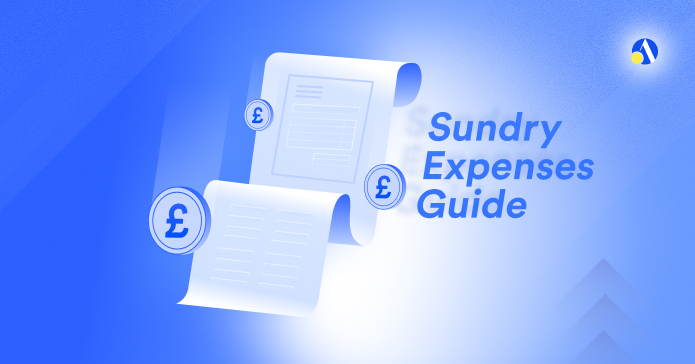What are sundry expenses? They are small, one-off business costs that don’t fit neatly into standard accounting categories. Also known as miscellaneous expenses, these irregular payments might seem insignificant on their own, but they can add up to significant tax savings when properly recorded.
According to research by The Association of Chartered Certified Accountants, 68% of small businesses fail to claim all their allowable expenses, missing out on potential tax relief worth thousands of pounds annually.
Sundry vs General Expenses: Understanding the Key Differences
| Sundry Expenses | General Expenses |
| One-off or sporadic costs | Regular, predictable costs |
| Small amounts | Usually larger amounts |
| Difficult to categorise | Easy to fit into standard categories |
| Examples: charitable donations, employee gifts | Examples: rent, utilities, salaries |
| Irregular timing | Consistent occurrence |
What Does "Sundry" Mean in Accounting?
Sundry meaning in accounting describes minor, miscellaneous items that don't need their own category. The word itself comes from Old English, meaning "separate" or "distinct."
Sundry expenses are characterised by three key features:
- Irregularity: They don't occur on a predictable schedule
- Small value: Typically low-cost items
- Uniqueness: They don't fit into existing expense categories
When sundry expenses become regular occurrences, you should create a dedicated expense category for better financial tracking.
How to Calculate Sundry Expenses?
Calculating sundry expenses is a straightforward process. Here’s how you can do it:
- Identify qualifying expenses: Review your costs throughout the accounting period and flag any that are small, irregular, and don’t fit standard categories.
- Record each expense: Log every sundry expense with proper documentation, like receipts or invoices.
- Sum all sundry expenses: At the end of the period, add up the total value of all recorded sundry expenses.
- Report the total: Record the final figure as a single line item, "sundry expenses," on your income statement.
Here's the basic calculation:
Total Sundry Expenses = Sum of all miscellaneous costs that don't fit standard categories
For example, if during the year you spent:
- £50 on office Christmas decorations
- £25 on a retirement gift for an employee
- £75 on a one-off charitable donation
- £30 on unexpected postage fees
Your total sundry expenses would be £180.
Need to calculate other business expenses? Find our calculators here
How Do I Claim Sundry Expenses?
Claiming sundry expenses depends on your business structure:
For Limited Companies
Submit a Company Tax Return including all sundry expenses to reduce your Corporation Tax liability. These expenses lower your taxable profit, directly impacting the amount of Corporation Tax you'll pay.
To find out more about expenses that you probably didn`t know exist, read here
For Sole Traders
Include sundry expenses in your Self Assessment tax return. This reduces your taxable income, lowering your Income Tax obligations.
Essential Requirements for Claims
- Keep detailed receipts and records. For details on required documents for self-employed individuals, explore our blog.
- Ensure expenses are wholly and exclusively for business purposes. For a comprehensive definition of business expenses, read our blog.
- Document the business reason for each expense
- Maintain organised records for HMRC inspection
VAT-registered businesses can also reclaim VAT on sundry expenses, provided you have proper VAT receipts. Learn everything about VAT registered businesses, VAT returns and more here
What Is an Example of a Sundry Expense?
Sundry expenses are typically one-off costs that don't fit into standard accounting categories. Common examples include:
- One-off charitable donations
- Leaving gifts for employees
- Unexpected bank charges
- Minor travel costs like parking or tolls
- Small, infrequent office supply purchases
- Occasional professional membership fees
- Single-use promotional items
For instance, imagine your business sponsors a local charity event for £100. Since this cost isn't a recurring expense and doesn't fall under a regular budget category like marketing, it would be classified as a sundry expense.
Recording and Managing Your Sundry Expenses
Documenting Sundry Expenses: Best Practices
How can you effectively keep track of these small, varied costs?
- Go digital with receipts: Use smartphone apps to quickly capture and store receipts as soon as you get them. This prevents lost paperwork.
- Use expense tracking software: Cloud-based solutions can help you record expenses in real-time, making management simpler.
- Review monthly: Regularly check your sundry expenses to spot any patterns or unexpected costs.
- Seek professional guidance: For tricky categorisations, always consult your accountant. They can help ensure everything is correctly recorded.
Tax Planning Benefits
Even though sundry expenses are small, they offer valuable tax advantages:
- Reduce taxable profits for Corporation Tax
- Lower Income Tax liabilities for sole traders
- Provide VAT relief opportunities for registered businesses
- Support accurate financial reporting and compliance
Remember, comprehensive record-keeping ensures you're paying the correct amount of tax whilst claiming all available relief. These seemingly minor expenses can accumulate to significant tax savings over your financial year.
Small Costs, Big Savings: Unlocking the Hidden Potential of Sundry Expenses
Maximising tax savings begins with understanding how every expense, including sundries, can reduce your taxable profits, lower Income Tax, and offer VAT relief. By keeping accurate financial records, your business stays compliant with HMRC regulations and benefits from significant savings.
At Debitam, we simplify tax management for small and medium-sized businesses with tailored insights, proactive deadline reminders, and guided support for Corporation Tax filing. Our platform helps you confidently claim every eligible tax relief, optimise deductions, and meet compliance requirements with ease. Take control of your financial reporting with Debitam—your partner for efficient and stress-free tax solutions.














